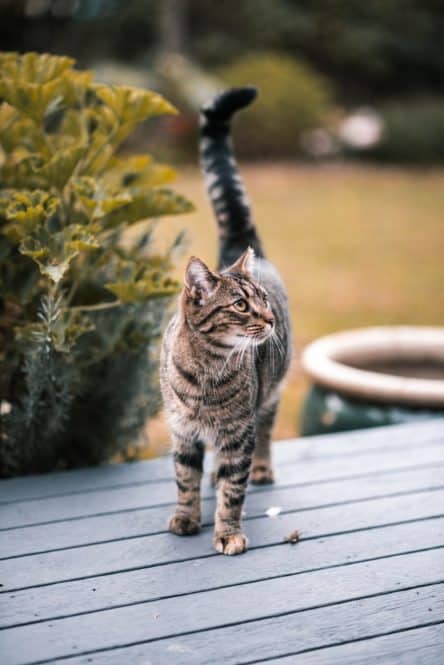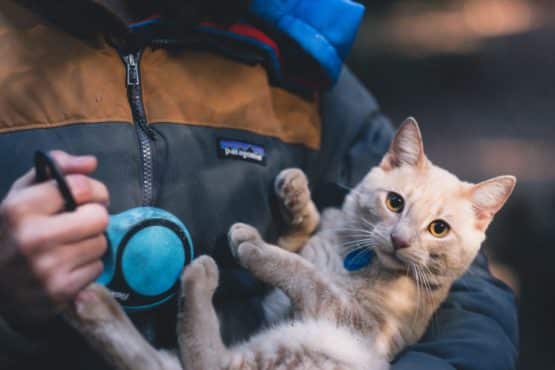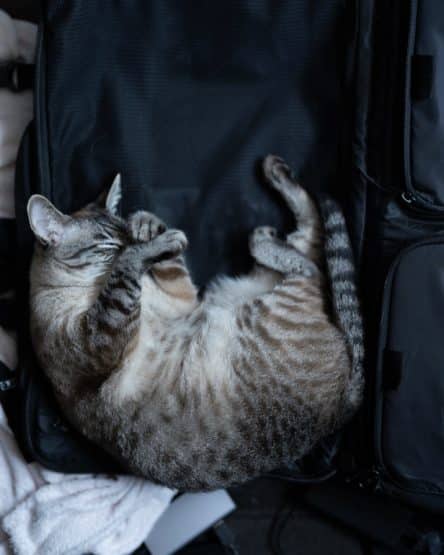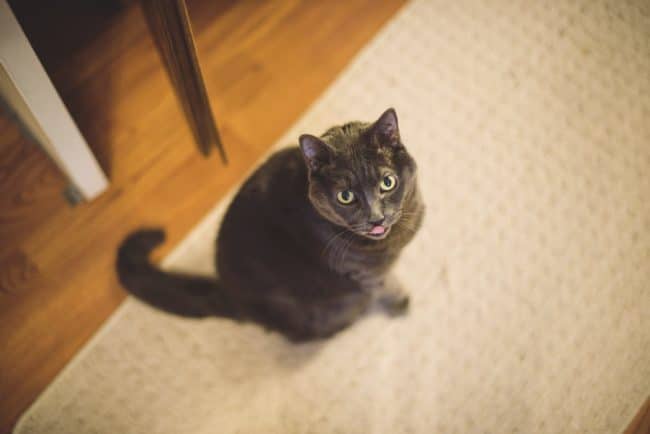You may ask yourself: “Can cats eat feta cheese?” or any other type of cheese. So, let’s see how we can keep that kitty happy and healthy.
Why are cats attracted to feta cheese?

Cats are carnivores and thrive on a diet of protein and fat from various meat sources. [1]
Domesticated cats live around our households and have contact with foods they wouldn’t have a chance to taste otherwise.
We tend to think that animals are smart and know what they should eat and what they should not. The issue with cats though is that they have fewer taste buds than dogs and humans.[2]
They have less than 1000 taste buds compared to the almost 9000 we humans use to enjoy flavors!
So, while cats cannot perceive sweet and salty tastes properly, they are attracted by the fat in all kinds of foods. And these foods can be more or less suitable for them, such as yogurt or chocolate. This attraction to fat can make pet owners thing that their cats ‘like’ potato chips or ice cream.
In fact, cats’ instincts tell them to go for anything fatty or oily. This would not have been a problem in the wild, where there are fewer attractive yet harmful foods. On the other hand, ingesting the soy bean oil in a tin of sardines is a different story.
Cheese is not a part of cats’ natural diet
Cats and their ancestors are obligated carnivores. This means they survive and thrive by consuming meat products.
Cheese may seem like a good option to feed your cat because it contains both proteins and fat. However, it contains one more crucial ingredient – lactose. And cats become lactose intolerant after being weaned from their mother’s milk. [3]
One would think that cheese substitutes that do not contain lactose should be fine, but this is not the case. These products are actually high in salt and fat, two ingredients harmful to your cat when offered in large quantities.
What is feta cheese?

Feta cheese is found in many kitchens as it represents a source of good fats and calcium. This cheese variety is often added to salads to turn them into delicious treats.
Feta cheese has originated in Greece and is a brined curd cheese obtained from sheep’s milk. It is considered a healthier option compared to cheese made from cow’s milk because it contains more calcium.
Feta cheese is used in salads, omelets, pastries, and sandwiches. Its creamy mouth feel makes it unmistakable, as well as its tangy flavor.
One issue about it is the fact that is conserved in brine. This can be a problem if you do not tolerate salt very well. Humans are not the only ones who may not deal very well with salt. Many pets are also known to require a low-sodium diet.
Can cats eat feta cheese?

The main thing to remember is that feta cheese is a dairy product. If you wonder what type of cheese can cats eat, the answer is none.
Cheese is obtained from milk and contains lactose, a type of sugar found in milk. Humans have in their digestive system an enzyme called lactase that breaks down sugar so it can be absorbed.
Many animals, though, including cats, lack this enzyme after being weaned.
For those wondering is feta cheese safe for dogs, the issue is the same. Most dogs are also lactose intolerant.
We humans used to lack it too, but we have evolved to become able to break down lactose. This change required about 20,000 years of evolution. Since milk is so nutritious, the ancient Neolithic human developed lactose tolerance to enjoy the benefits of dairy products.
There are still people who are lactose intolerant, as well as many animals. What happens is that lactose does not get broken down in the small intestine. It reaches the colon where it ferments, causing symptoms such as bloating, gas, and diarrhea.
Processing milk into cheese does remove some of the lactose, but sugar quantities remain sufficient to cause an upset stomach. So, if your cat eats a little more cheese, it will probably have digestive problems.
But can you give kittens cheese?
The fact that kitten can digest milk can make you think that they can also eat cheese. However, you are mistaken.
Even if kittens produce a larger amount of lactase, as soon as weaning starts the levels of enzyme decrease. So, by the time the kitten is able to eat solids safely, their ability to break down lactose is already gone.
More than that, kittens have strict dietary requirements. In order to grow and develop properly they need certain nutrients. You only need to feed them the right things that meet their dietary demands. Something that causes poor digestion can cause permanent damage to their intestines.
Is feta cheese bad for cats?

Again, can cats eat feta cheese? Considering its lactose and salt content, we can affirm that feta cheese is not suitable for cats.
The lactose can upset the cat’s digestive system and the large quantity of salt is dangerous. It can cause thirst, lethargy, weakness, poor appetite, seizures, and even internal bleeding.
Given the fact that cats can’t taste salt properly, overeating is possible. The electrolyte imbalance can put the pet’s life at risk. No wonder some pet owners ask ‘can cheese kill cats?’
Another issue related to dairy consumption is that some medicines do not get absorbed when taken with high calcium foods. Doxycycline, for instance, gets bound to calcium. So, skip dairy when your cat is taking medication just to be sure. [4]
What can happen if you feed your cat cheese
Several things can happen if you feed your cat cheese and the quantity is too large:
- Getting a stomach upset because of the lactose
Gastrointestinal issues can develop if you feed your cat feta cheese. Most common symptoms are vomiting, diarrhea, and bloating. A small piece of cheese may not represent a problem, but since cats don’t need dairy, why complicate matters?
- Eating large amounts of fat
Certain types of cheese can have a high fat content. This can cause health issues such as obesity, heart disease, and pancreatitis.
- Eating too much salt
As explained earlier, cats need a specific amount of sodium and too much salt will cause imbalances. In most cases, the cat will vomit after overeating salty cheese.
- Ingesting other toxic ingredients
Some types of feta cheese can contain additives that are toxic for cats. Onions, garlic, and certain spices can cause serious health issues in felines.
What other foods are bad for cats and kittens?

There are multiple foods that are harmless and nutritious to us humans but represent a danger to cats. The most common foods to avoid with cats are:
- Chocolate
This delicious treat contains theobromine, a substance that is toxic to cats. High exposure can lead to coma and death.
- Raw meat, eggs, and fish
They can be contaminated with dangerous bacteria such as E. coli and Salmonella. These pathogens can cause lethal health conditions.
- Dog food
Out of cat food for sensitive stomach so thinking about some dog food before replenishing your stocks? An occasional meal won’t hurt, but a steady dog food diet is harmful. This type of food does not contain the nutrients needed by felines.
- Onions and garlic
These plants contain a substance causing anemia in cats, with symptoms such as nausea, abdominal pain, diarrhea, and vomiting. All forms of plants from the allium family are dangerous, whether they are raw or cooked, powdered or dehydrated.
- Grapes
Ingestion of grapes causes kidney failure in cats for a reason that still remains largely unknown.
What kind of cheese can cats eat and in what amounts?
The answer depends on the amount of lactose in the cheese and the cat’s degree of lactose intolerance. Offering a small amount is key if you want to avoid severe symptoms. However, it is better not to offer your kitty any cheese at all. It has little nutritional value and can cause more harm than good.
It is difficult to come up with a precise answer to ‘Can cats eat feta cheese?’ You never know what is too much.
What to do if your cat eats something harmful?
It is impossible to keep a close eye on your cat all the time. Even if you decide to feed them just the right things, accidental ingestion can happen. Cats may steal food, scavenge leftovers, or beg for inappropriate treats.
Nobody likes the situation when their pet has eaten something they shouldn’t have. If it does happen, look for symptoms such as unusual behavior, diarrhea, vomiting, lack of appetite, etc.
First of all, do no panic. Seek the vet’s advice and he or she will inform you on the next steps. Do not attempt to make the cat vomit or give medication yourself. This can make the situation worse.
Conclusion
Can cats eat feta cheese? They can have small amounts, but you risk giving them all kids of health problems. Better opt for appropriate treats and you will spare your friend from an unpleasant visit to the vet.